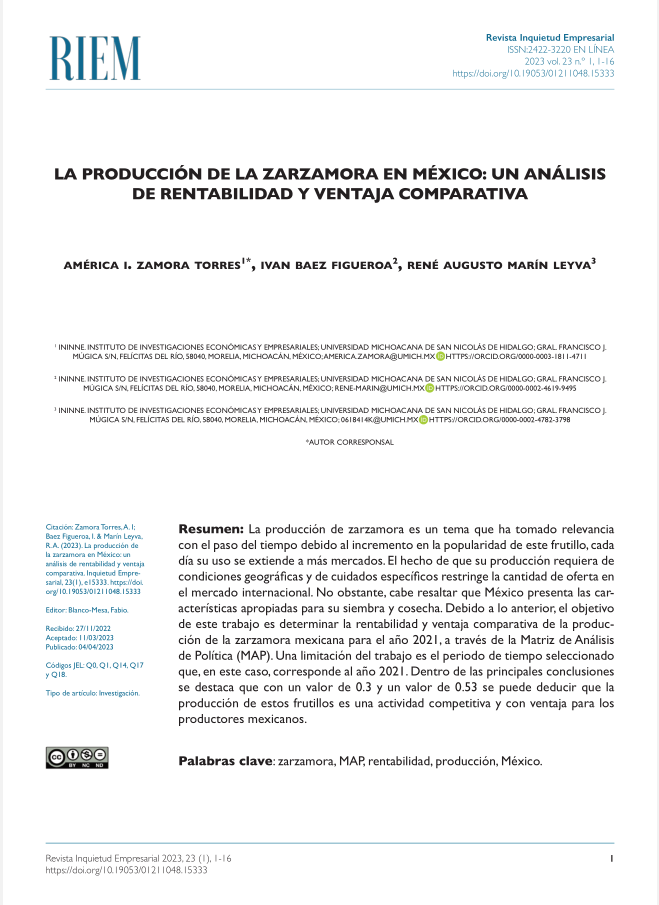Blackberry Production in México: Analysis of Profitability and Comparative Advantage

Abstract
The production of blackberry is an issue that has become relevant over time due to the increase in the popularity of this berry, every day its use extends to more markets. The fact that its production requires specific geographical conditions and specific care, restricts the amount of supply in the international market, due to this it is noteworthy that in Mexico it presents the appropriate characteristics for planting and harvesting. Therefore, the objective of this work is to determine the profitability and comparative advantage of Mexican blackberry production for the year 2021, through the Policy Analysis Matrix (PAM). Among the main conclusions, it stands out that with a value of 0.3 and 0.53, it can be deduced that blackberry production is a competitive activity with an advantage for Mexican producers.
JEL Codes: Q0, Q1, Q14, Q17 y Q18
Received: 27/11/2022. Accepted: 11/03/2023. Published: 04/04/2023.
Keywords
blackberry, PAM, profitability, production, Mexico
Author Biography
América Ivonne Zamora Torres
Ivan Baez Figueroa
René Augusto Marín Leyva
References
- Amat, O., y Soldevila, P. (1998). Contabilidad de Gestión y Reducción de Costes. Ediciones Gestión 2000.
- Banco de México. (2021.). Documentos de investigación del Banco de México. https://www.banxico.org.mx/DIBM/
- Dixon, J. M., y Upton M. (1996). Métodos de análisis a nivel micro para programas y políticas agrarias. Organización de las Naciones Unidas para la Agricultura y la Alimentación.
- Eslava, J. (2003). Análisis económico-financiero de las decisiones de gestión empresarial. ESIC Editorial.
- Gitman, L. (1997). Fundamentos de administración financiera. Harla S. A.
- Gobierno de México (2022). Zarzamora, la frutilla número uno de México. https://www.gob.mx/agricultura/articulos/zarzamora-la-frutilla-numero-uno-de-mexico
- Instituto Nacional de Estadística y Geografía [INEGI]. (2021). https://www.inegi.org.mx/tablerosestadisticos/series_de_tiempo/
- Krugman, P. R., y Obstfeld, M. (2008). Economía Internacional, Teoría y Política. Pearson Educación.
- Monke, E. A., y Pearson, S. R. (1989). The policy analysis matrix for agricultural development. Cornell University Press.
- Morillo, M. (2001). Rentabilidad Financiera y Reducción de Costos. Actualidad Contable Faces, 4(4), 35-48.
- Organización de las Naciones Unidas para la Agricultura y la Alimentación [FAO] (2021). Cultivos y productos de ganadería. https://www.fao.org/faostat/es/#data/QCL
- Pérez-Carballo, V. (2013). Control de gestión empresarial (8va ed.). ESIC Editorial.
- Porter, M. E. (1990). The competitive advantage of nations. Plaza & Janés Editores. https://doi.org/10.1007/978-1-349-11336-1
- Real Academia Española [RAE]. (s.f.). Zarzamora. https://dle.rae.es/zarzamora
- Secretaría de Agricultura, Ganadería, Desarrollo Rural, Pesca y Alimentación [SAGARPA]. (2021, 18 de mayo). Agricultura. https://www.gob.mx/agricultura
- Secretaría del Medio Ambiente [SEDEMA]. (2021, 9 de abril). Agricultura. http://www.sadsma.cdmx.gob.mx:9000/datos/glosario-definicion/Agricultura#:~:text=La%20agricultura%20se%20define%20como,cr%C3%ADa%20y%20desarrollo%20de%20ganado
- Sallenave, J. P. (1990). Gerencia y Planeación Estratégica. Norma.
- Shank, J., y Govindarajan, V. (1998). Gerencia Estratégica de Costos. La nueva herramienta para desarrollar ventajas competitivas. Norma.
- Smith, A. (1991). The wealth of nations. Prometheus Books. [1776].
- Stickney, C., Weil, R., Schipper, K., Francis, J., y Avolio Alecchi, B. (2013). Contabilidad financiera: Una introducción a conceptos, métodos y usos (1ra ed.). Cengage Learning Argentina.
